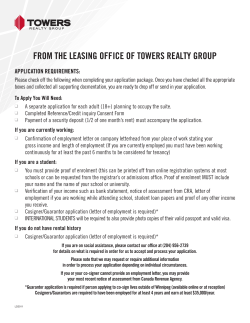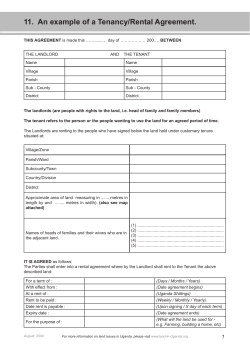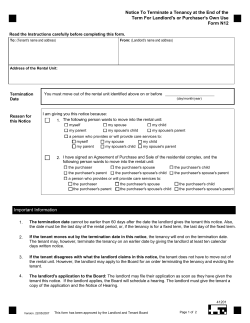
Breaking a lease early Information for tenants
March 2012 FTR78 Breaking a lease early Information for tenants When you sign a fixed term tenancy agreement (lease) you are committing to stay for the full term. If your circumstances change and you want to move out before the end of the fixed term there are potential costs involved. There are some circumstances where a fixed term agreement can be terminated early without penalty. Refer to the section ‘Breaking the agreement without penalty’ below. pay or if you disagree with the amount, the landlord or agent will usually claim from your bond or apply to the Consumer, Trader and Tenancy Tribunal. Be aware that if you owe more money than the bond your name could be listed on a tenancy database. Such listings can make it difficult to rent again anywhere in Australia. Costs you may have to pay You and the landlord can agree to include a break fee clause in the additional terms of your tenancy agreement. The break fee is a penalty you agree to pay if you move out before the end of the fixed term. Breaking your tenancy agreement during the fixed term can be costly. You may have to pay: rent until a new tenant takes over or the fixed term period ends, whichever occurs first, and ● a percentage of the advertising costs and the agent's reletting fee (if the landlord uses an agent). For example, if you break the lease 9 months into a 12‑month tenancy there is 25% of the lease remaining, so you would expect to pay 25% of these amounts. ● If you need to end your agreement early you should give as much notice as you can. The landlord or agent must take all reasonable steps to find a replacement tenant as soon as possible. The more you can do to help, the less you may have to pay. You should make it as easy as possible for the landlord or agent to show the premises to potential new tenants. If you are concerned that it is taking a long time to find a new tenant, you can check that the landlord or agent is trying to relet the property. Check the agent's website and their list of available rental properties. The landlord and agent must try to keep your costs to a minimum. For example, if they do anything to make it harder to find a new tenant (such as asking for a higher rent or unreasonably rejecting potential tenants) you may not have to pay the full amount they are asking. Once the new tenant is found the landlord or agent will request payment for the amount you owe. If you don't Optional break fee If the fixed term of the agreement is for 3 years or less the break fee is: 6 weeks rent if you move out in the first half of the fixed term ● 4 weeks rent if you move out in the second half of the fixed term. ● If the fixed term is for more than 3 years and you and the landlord agree to include a break fee clause, you can agree on the amount and write it into the agreement. Where there is a break fee in your agreement that is all you have to pay if you move out early. However, if the landlord or agent find a new tenant quickly it does not mean that you will get any of the break fee back. It is a fixed fee. Breach by the landlord If your landlord is not complying with the terms of your tenancy agreement you may be able to end your lease early without penalty, for example, if the landlord is failing to keep the premises in reasonable repair. If you think the breach is serious enough to justify ending the tenancy, you can give 14 days written termination notice to the landlord. If they disagree they can apply to the Tribunal. March 2012 FTR78 Alternatively, you can apply to the Tribunal without giving notice. You will need to take evidence to satisfy the Tribunal that the breach justifies ending the agreement. The Tribunal can refuse to make an order if the landlord remedies the breach. If you had already moved out, you may have to pay the costs of breaking the lease. Hardship Breaking the agreement without penalty You will need to satisfy the Tribunal that special circumstances exist which were not in place when you first moved in and that your hardship is severe or serious. If the Tribunal agrees that your tenancy can end early it may order you to compensate the landlord for lost rent and other losses. In limited circumstances you can break the agreement early without penalty. You can give 14 days written notice to end an agreement early if: you have accepted an offer of social housing (eg. from Housing NSW) ● you need to move into an aged care facility or nursing home (not a retirement village) ● you have obtained a final apprehended violence order against somebody you were living with that excludes them from the property ● the landlord has put the premises on the market for sale, and you were not told before signing the lease that the property would be sold. ● You can give 21 days written notice to end an agreement early if: you have a fixed term agreement of more than 2 years and you have been given a rent increase notice or ● your co‑tenant passes away. ● If you give notice for any of these reasons you are able to end the agreement early without having to pay any compensation or other costs to the landlord. You are only liable for the rent until your notice ends and you hand back possession of the premises. If it would cause you undue hardship to stay in the premises until the end of the fixed term you can apply to the Tribunal to end the agreement early. You can ask for an urgent hearing but will need to keep paying the rent. At a glance The table below lists the key differences between the old Act and the tenancy laws that began on 31 January 2011. Old laws New laws Tenant breaking lease early treated as abandonment and liable to compensate landlord fully for any loss Optional break fee can be included in tenancy agreement, limiting the costs a tenant can be charged for breaking a lease early Tenant could seek order from Tribunal to end lease early on undue hardship grounds Undue hardship grounds retained and tenants can also end lease early in certain circumstances including moving to a nursing home or accepting a social housing offer Mutual consent Any tenancy agreement can be ended at any time if the landlord and tenant mutually agree. www.fairtrading.nsw.gov.au Fair Trading enquiries 13 32 20 TTY 1300 723 404 Language assistance 13 14 50 This fact sheet must not be relied on as legal advice. For more information about this topic, refer to the appropriate legislation. © State of New South Wales through NSW Fair Trading You may freely copy, distribute, display or download this information with some important restrictions. See NSW Fair Trading's copyright policy at www.fairtrading.nsw.gov.au or email publications@services.nsw.gov.au
© Copyright 2025

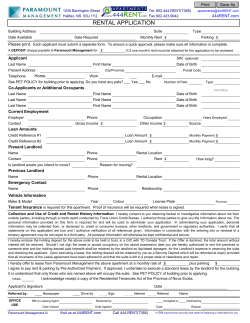


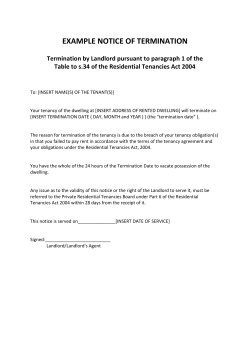


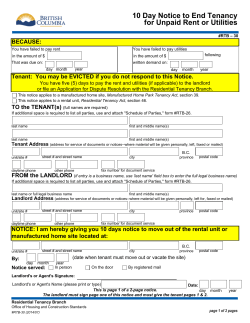

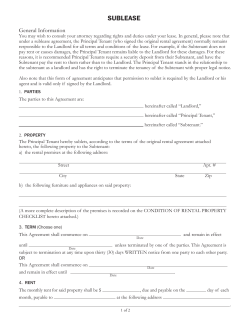
![Sample Letter: Improper Rule Change/Fee or Rent Increase [Date] [Landlord/Manager’s Name]](http://cdn1.abcdocz.com/store/data/000031198_2-6d3ce7b943ede5629a20f08c47060981-250x500.png)
